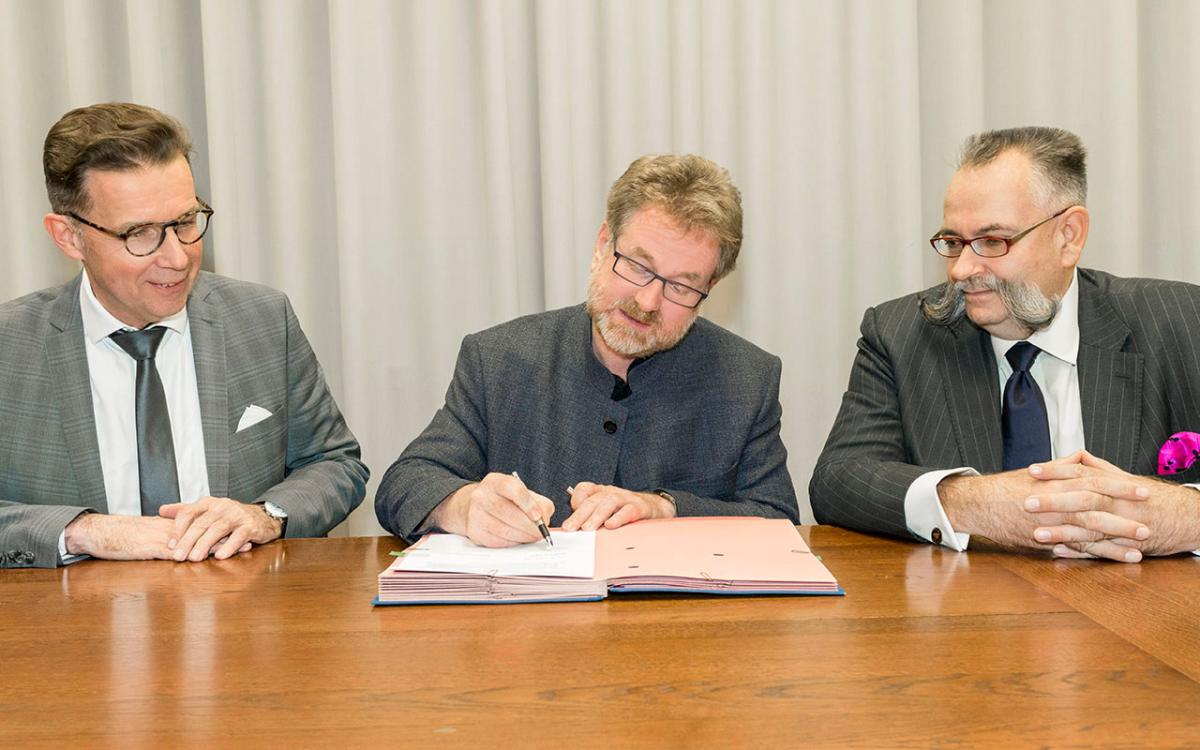Berlin, 7.11.2019: The Museum für Naturkunde Berlin (MfN), a research museum of the Leibniz Association, and the Hochschule für Technik und Wirtschaft (HTW) Berlin have signed a cooperation agreement. The contracting parties will network even more closely by pooling their potential in research and teaching. The common goal is to create an efficient and competitive platform for teaching, research and technology transfer. In addition to the already completed cooperation, the expertise of the HTW Berlin in the field of construction and facility management will be used for the planned construction measures within the framework of the implementation of the future plan at the MfN.
Over the next ten years, the Museum für Naturkunde Berlin (MfN) and Humboldt-Universität zu Berlin will develop a science campus for nature and society in the heart of Berlin as a science location. New laboratories and jobs will be created for cutting-edge research. At the same time, one of the world's most comprehensive natural history collections with over 30 million objects will be housed in modern collection buildings and completely digitized. New exhibition rooms will be created for visitors, showing the diversity of nature and at the same time research for nature. In addition, conference and event rooms for science communication are planned. The aim is to create future-oriented research and effective knowledge transfer in one place in order to strengthen the democratic knowledge society.
"The implementation of the Future Plan, funded with a total of 660 million Euros by the Federal Government and the State of Berlin with the Museum of Natural History as the heart of the science campus, will only succeed with strong interdisciplinary national and international partnerships. We are therefore delighted about the signing of the cooperation agreement with the HTW Berlin," said Director General Johannes Vogel. "The HTW Berlin has great expertise in the field of construction and facility management. For the construction measures planned as part of the future plan, cooperation with HTW Berlin will be intensified in well-structured projects such as the acquisition of existing buildings using digital methods for the Invalidenstrasse 42/43 property or the strategy development for facility management," says Managing Director Stephan Junker.
"Science, research and development are based on exchange and cooperation," adds Carsten Busch, President of the HTW Berlin. "The HTW Berlin and the Museum of Natural History have already been cooperating for many years in a wide variety of areas in projects, internships and exchange relationships. That is why I am all the more pleased that we can intensify our cooperation even more with the contract that has now been signed. We will not only cooperate in the field of facility management, but also in various fields such as museum science and digitization. I would like to thank the Museum of Natural History for its initiative in concluding the cooperation agreement and look forward to many exciting joint tasks for the HTW Berlin".
The HTW Berlin has great successes in the field of ecological construction, the use of renewable energies and building information modeling. For example, 3D models of rooms are created that can be used to simulate energy consumption or for exhibition design and route guidance. Once the construction measures have been completed, these models can be transferred to facility management and thus facilitate the long-term operation of the property. The early recording of parts of the existing building using digital methods can be used for necessary coordination, e.g. with the monument protection authority. Both partners benefit from the strategy and concept development with the HTW Berlin, as working students or interns of the HTW Berlin can carry out their work at the MfN.
Background information on long-standing cooperation
The Museum für Naturkunde Berlin and the HTW Berlin have been working closely together for many years, for example in the joint project GenomELECTION funded by the Federal Ministry of Education and Research. The latest gene technology methods, such as CRISPR-CAS-9, have a potential influence on the question of which world we want to live in. The research project Genome Editing is part of the interdisciplinary joint project GenomELECTION, which focuses on ethical, legal and communication science aspects in the field of molecular medicine and crop breeding. The subproject at the Museum für Naturkunde Berlin asked about the influence of practical experiences on the perception of technologies. With the development of participatory offers, the project created a space for an open dialogue between scientific, social and political actors. Together with Prof. Tobias Nettke (HTW Berlin), member of the network's scientific advisory board, the change in knowledge and perception was examined in relation to the approaches of science communication.
A cooperation with the HTW Berlin also took place in the third-party funded project "Visitor Participation in the Museum of Natural History for the Promotion of Science Communication and Knowledge Transfer", funded by the Deutsche Bundesstiftung Umwelt. Here, participatory processes and tools were developed and investigated that enable the integration of various social groups into scientific processes and discourses. In workshops with museum staff, visitors and external experts, formats and possible applications of participative tools such as a story tent, opinion boxes and an action for naming a newly discovered animal species have been developed since the beginning of the project. Within the framework of practical projects, the use of participative formats and tools was scientifically monitored and evaluated by students of the Master's programme in Museum Management and Communication at the HTW Berlin. The results of the project form the basis for the experimental field for participation and open science, in which the museum creates new formats for the dialogue between science and the public, promotes the opening of science and offers a space for exchange.
